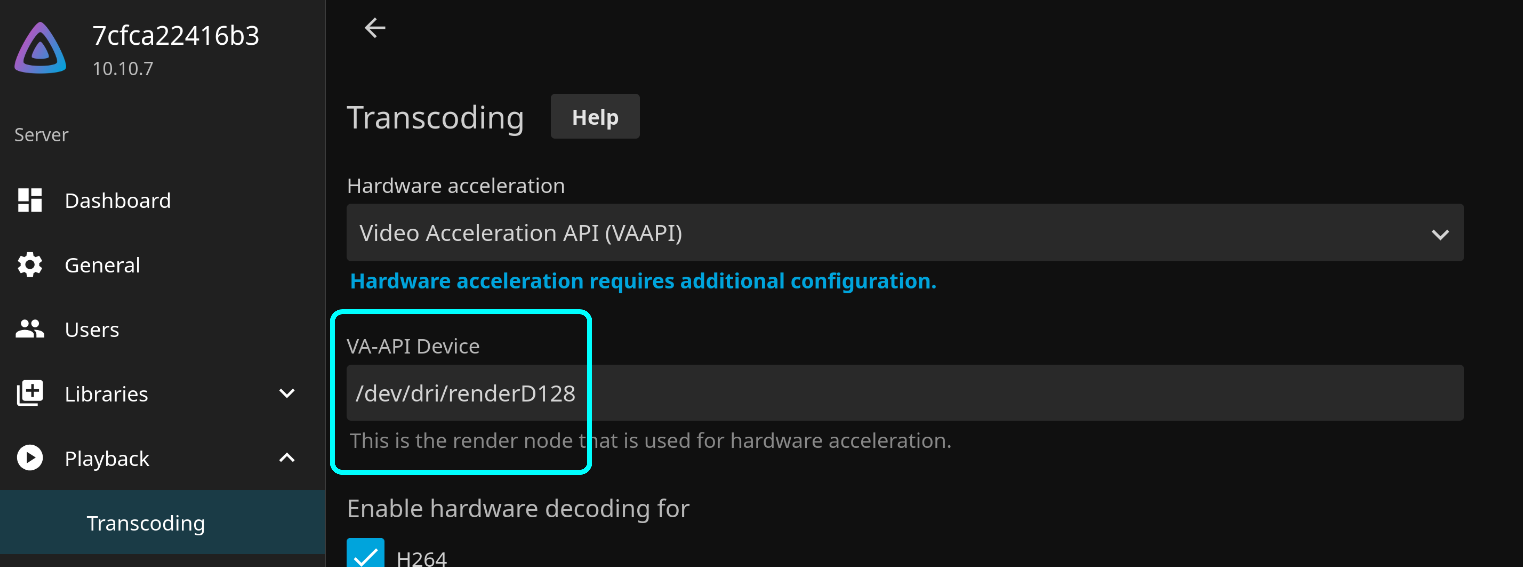| README.md | ||
AMD Radeon + Jellyfin + Docker: Enable GPU Hardware Acceleration for Encoding
Overview
from a networking perspective it looks like this (put inside mermaid.live)
graph TD
User(User Browser)
subgraph fedora HOST
Caddy[Caddy Container: 80/443]
Jellyfin[Jellyfin Container: 8096]
end
User --> |http request --> your.domain | Caddy
Caddy -->|Proxy to port 8096| Jellyfin
The file structure looks like this
.
├── docker-compose.yml
└── volume-bindings
├── caddy
│ ├── Caddyfile
│ └── data
└── jellyfin
├── cache
└── config
docker-compose.yml
version: '3.5'
networks:
caddy:
services:
caddy:
image: caddy:latest
container_name: my-caddy
restart: always
ports:
- "80:80"
- "443:443"
volumes:
- ./volume-bindings/caddy/Caddyfile:/etc/caddy/Caddyfile # !ADJUST
- caddy-data:/data # remember ssl certificates
networks:
- caddy
jellyfin:
image: jellyfin/jellyfin:latest
container_name: my-jellyfin
user: 1000:1000
group_add:
- "105" # !ADJUST Change this to match your "render" host group id and remove this comment
networks:
- caddy
volumes: # !ADJUST
- ./volume-bindings/jellyfin/config:/config
- ./volume-bindings/jellyfin/cache:/cache
- /mnt/QVO8TB-A/:/media:ro
- /mnt/QVO8TB-B/:/media2:ro
- /mnt/QVO8TB-C/:/media3:ro
devices:
- /dev/dri:/dev/dri
restart: 'always'
# Optional - alternative address used for autodiscovery
ports:
- 8096:8096
environment:
- JELLYFIN_PublishedServerUrl=http://entertain.ramboe.io # !ADJUST
extra_hosts:
- "host.docker.internal:host-gateway"
volumes:
caddy-data: # create volume for caddy (to remember ssl certificates)
driver: local
driver_opts:
type: none
device: /mnt/QVO4TB/volume-bindings/caddy/data # !ADJUST
o: bind
Caddyfile
your.domain {
reverse_proxy my-jellyfin:8096
}
docker-compose.yml - the imporant parts for our scenario
version: '3.5'
networks:
caddy:
services:
# ...
jellyfin:
# ...
group_add:
- "105" # Change this to match your "render" host group id and remove this comment
devices:
- /dev/dri:/dev/dri # makes the host's GPU available for the container
Prerequisites
Check VAAPI Support on Host
vainfo
faulty output
Trying display: wayland
Trying display: x11
error: can't connect to X server!
Trying display: drm
libva info: VA-API version 1.22.0
libva info: Trying to open /usr/lib64/dri-nonfree/radeonsi_drv_video.so
libva info: Trying to open /usr/lib64/dri-freeworld/radeonsi_drv_video.so
libva info: Trying to open /usr/lib64/dri/radeonsi_drv_video.so
libva info: Found init function __vaDriverInit_1_22
libva info: va_openDriver() returns 0
vainfo: VA-API version: 1.22 (libva 2.22.0)
vainfo: Driver version: Mesa Gallium driver 25.0.7 for AMD Radeon RX 6700 XT (radeonsi, navi22, LLVM 19.1.7, DRM 3.63, 6.15.6-100.fc41.x86_64)
vainfo: Supported profile and entrypoints
VAProfileMPEG2Simple : VAEntrypointVLD
VAProfileMPEG2Main : VAEntrypointVLD
VAProfileJPEGBaseline : VAEntrypointVLD
VAProfileVP9Profile0 : VAEntrypointVLD
VAProfileVP9Profile2 : VAEntrypointVLD
VAProfileAV1Profile0 : VAEntrypointVLD
VAProfileNone : VAEntrypointVideoProc
expected output
Trying display: wayland
Trying display: x11
error: can't connect to X server!
Trying display: drm
libva info: VA-API version 1.22.0
libva info: Trying to open /usr/lib64/dri-nonfree/radeonsi_drv_video.so
libva info: Trying to open /usr/lib64/dri-freeworld/radeonsi_drv_video.so
libva info: Found init function __vaDriverInit_1_22
libva info: va_openDriver() returns 0
vainfo: VA-API version: 1.22 (libva 2.22.0)
vainfo: Driver version: Mesa Gallium driver 25.0.7 for AMD Radeon RX 6700 XT (radeonsi, navi22, LLVM 19.1.7, DRM 3.63, 6.15.6-100.fc41.x86_64)
vainfo: Supported profile and entrypoints
VAProfileMPEG2Simple : VAEntrypointVLD
VAProfileMPEG2Main : VAEntrypointVLD
VAProfileVC1Simple : VAEntrypointVLD
VAProfileVC1Main : VAEntrypointVLD
VAProfileVC1Advanced : VAEntrypointVLD
VAProfileH264ConstrainedBaseline: VAEntrypointVLD
VAProfileH264ConstrainedBaseline: VAEntrypointEncSlice
VAProfileH264Main : VAEntrypointVLD
VAProfileH264Main : VAEntrypointEncSlice
VAProfileH264High : VAEntrypointVLD
VAProfileH264High : VAEntrypointEncSlice
VAProfileHEVCMain : VAEntrypointVLD
VAProfileHEVCMain : VAEntrypointEncSlice
VAProfileHEVCMain10 : VAEntrypointVLD
VAProfileHEVCMain10 : VAEntrypointEncSlice
VAProfileJPEGBaseline : VAEntrypointVLD
VAProfileVP9Profile0 : VAEntrypointVLD
VAProfileVP9Profile2 : VAEntrypointVLD
VAProfileAV1Profile0 : VAEntrypointVLD
VAProfileNone : VAEntrypointVideoProc
expected output (simplified)
libva info: VA-API version ...
...
VAProfileH264Main : VAEntrypointVLD
VAProfileHEVCMain : VAEntrypointVLD
...
this means that hardware decoding of H.264 or HEVC via VAAPI is enabled.
If machine has no VAAPI support yet
Fedora: Install vainfo
sudo dnf install libva-utils mesa-va-drivers
Fedora: Install Mesa With Codec Support
On Fedora 41, and by default, Fedora ships a "free" Mesa stack — which intentionally disables H.264 and HEVC support for licensing reasons.
Enable RPM Fusion (if not already):
sudo dnf install \
https://download1.rpmfusion.org/free/fedora/rpmfusion-free-release-$(rpm -E %fedora).noarch.rpm \
https://download1.rpmfusion.org/nonfree/fedora/rpmfusion-nonfree-release-$(rpm -E %fedora).noarch.rpm
RPM Fusion is a third-party software repository for Fedora and RHEL-based Linux distributions. It provides software that Is not included in Fedora by default.
Install freeworld drivers:
sudo dnf swap mesa-va-drivers mesa-va-drivers-freeworld
reboot your system afterwards
Ubuntu: Install Mesa With Codec Support
untested, please give feedback if this works for you if you're host is Ubuntu
Install the VAAPI drivers
sudo apt update
sudo apt install i965-va-driver intel-media-va-driver libva-drm2 libva-x11-2 vainfo mesa-va-drivers
Install multimedia codecs (H.264, HEVC, etc.)
sudo apt install ubuntu-restricted-extras
Settings explained
renderD128
renderD128 is a device file on the filesystem.
This is created by the Linux kernel when it detects a GPU that supports DRM (Direct Rendering Manager) and rendering functions like VAAPI or OpenCL.
To find out if you have a renderD128 file, do this on the host:
# execute on host
ls -l /dev/dri
expected output
total 0
drwxr-xr-x. 2 root root 80 Jul 27 11:01 by-path
crw-rw----+ 1 root video 226, 1 Jul 27 11:09 card1
crw-rw-rw-. 1 root render 226, 128 Jul 27 11:01 renderD128
group_add
105 is the GID (group ID) of the render group on your machine, and that number can vary from system to system.
To find out your group ID, do this on the host:
# execute on host
getent group render
expected output
render:x:105:
Summary
the part
devices:
- /dev/dri:/dev/dri
maps the path where the renderD128 file resides so the host can access it. and group 105 makes sure the container has the right to access it. Drivers have to be installed correctly, see "If machine has no VAAPI support yet "
If it still doesn't work
Make sure there are no missing VAAPI libraries inside the container. jellyfin/jellyfin:latest runs on Ubuntu.
Enter the container
docker exec -u 0 -it my-jellyfin bash
install packages
apt update
apt install i965-va-driver intel-media-va-driver libva-drm2 libva-x11-2 vainfo mesa-va-drivers
restart container
docker compose stop
docker compose down
docker compose up
